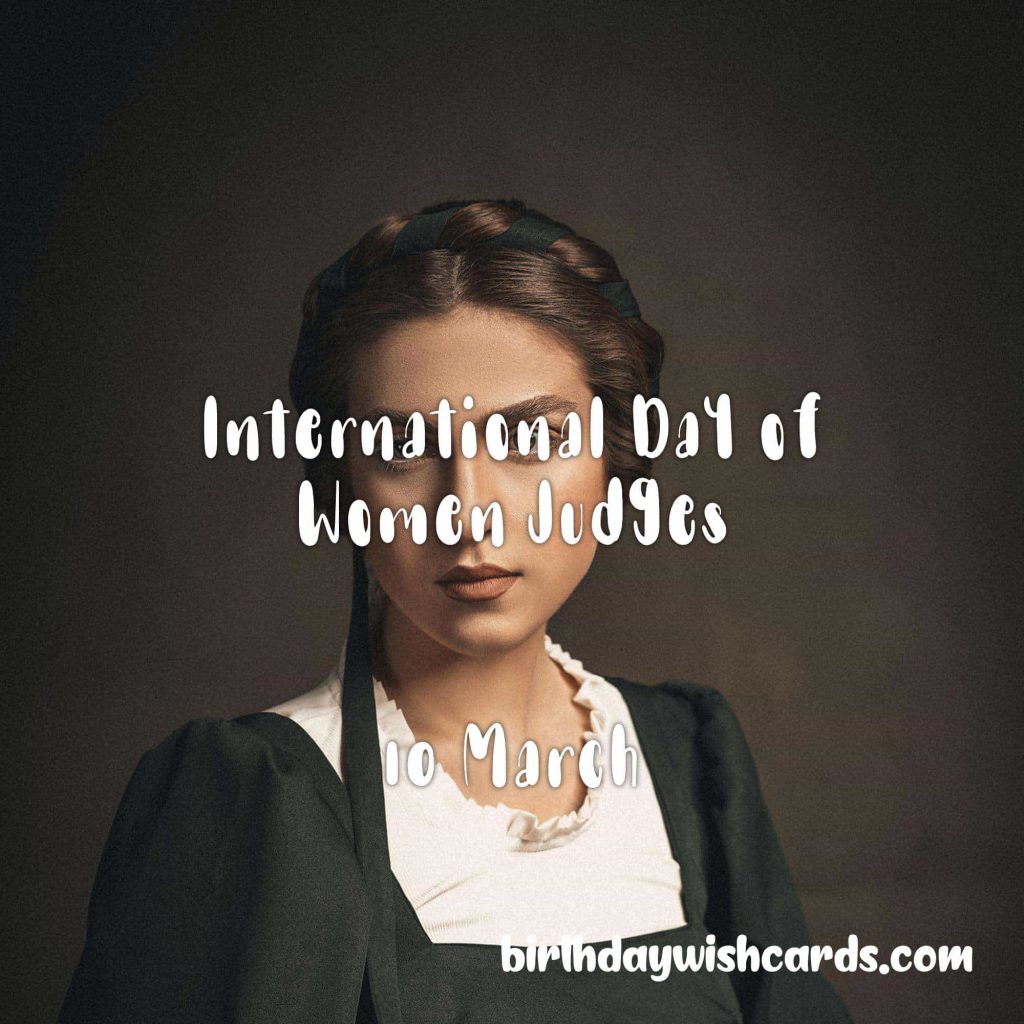
March 10: International Day of Women Judges
Origins of the Day
The International Day of Women Judges was officially established during the Opening Ceremony of the International Association of Women Judges (IAWJ) convention by then-President Vanessa Ruiz. March 10 was selected following the adoption of United Nations General Assembly Resolution A/RES/75/274 on April 28, 2021. Adopted by consensus and co-sponsored by seventy-two member states, this resolution marked a pivotal step in recognizing the vital role of women judges around the world.
The Idea Behind the Day
The concept for an international day honoring women judges was introduced the previous year by President Vanessa Ruiz on behalf of the IAWJ, together with Chief Justice Hassan Bin Lahdan Alhassan Almohanadi of Qatar. The announcement took place during the Second High-Level Meeting of the United Nations Office on Drugs and Crime (UNODC) Global Judicial Integrity Network in Doha.
The drafting and negotiation of the resolution at the United Nations were skillfully led by Her Excellency Alya Ahmed S. Al-Thani, Permanent Representative of Qatar to the UN. This collaboration highlighted a shared global commitment to gender equality within the judiciary and underscored the importance of judicial integrity and fairness.
During the Opening Ceremony, Judge Ruiz described the journey from inception to successful adoption of the resolution. Distinguished speakers—including Ambassador Al-Thani, Chief Justice Almohanadi, Judge Fatima Almal, and UNODC representatives Marco Teixeira and Roberta Solis—emphasized the significance of this observance. Judge Ruiz praised the United Nations’ recognition of the critical role women judges play in upholding the rule of law and advancing equal justice for all.
A Powerful Symbol for Equality
The International Day of Women Judges serves as a powerful symbol, celebrating the achievements of women judges worldwide. It raises public awareness of their essential contributions to the judiciary and inspires girls and women to pursue careers in law and justice.
Judge Ruiz also noted that this day is a call to action: despite progress, women remain under-represented at senior levels and in decision-making roles within the judiciary. Persistent barriers, including the “glass ceiling,” hinder their advancement. Collecting and monitoring data on women judges globally is essential to measure progress, identify gaps, and develop effective solutions to promote gender equality in the judiciary.
The Significance of Women Judges
Women judges are indispensable to the promotion of justice, fairness, and equality under the law. Their participation enriches judicial perspectives, fosters more inclusive decision-making, and ensures that the judiciary better reflects the diversity of society.
Increasing the representation of women judges leads to more balanced justice systems, which are crucial for protecting human rights and maintaining public trust in the rule of law. Women’s perspectives in legal interpretation and decision-making contribute significantly to safeguarding vulnerable groups and advancing gender-sensitive jurisprudence.
Challenges Facing Women Judges
- Under-representation: Women are still under-represented in senior judicial positions and leadership roles in many countries.
- Gender Bias and Stereotypes: Persistent biases and stereotypes can hinder career advancement and affect the professional experiences of women judges.
- Work-Life Balance: The demanding nature of judicial work, combined with societal expectations regarding family and caregiving, can present additional challenges.
- Lack of Data: Insufficient data on the status of women judges makes it difficult to track progress and implement targeted policies for gender equality.
Global Efforts to Support Women Judges
International organizations, governments, and civil society are actively working to improve the representation and working conditions of women judges. Key initiatives include:
- Advocating for gender-sensitive judicial appointments and promotions.
- Offering mentorship and professional development opportunities tailored to women judges.
- Promoting policies that support work-life balance, such as flexible working arrangements.
- Encouraging the collection and publication of gender-disaggregated data on judicial appointments.
- Raising awareness of the contributions and challenges of women judges through international observances like this day.
How the International Day of Women Judges is Celebrated
The International Day of Women Judges is commemorated worldwide through activities that celebrate women’s achievements in the judiciary and promote gender equality. Common observances include:
- Hosting conferences, seminars, and panel discussions to highlight the role of women judges.
- Launching public awareness campaigns on gender equality in the judiciary.
- Sharing stories and profiles of women judges to inspire future generations.
- Engaging the media to spotlight issues facing women in the judicial profession.
- Promoting educational programs that encourage girls and young women to pursue legal careers.
Images Celebrating Women Judges
The images below highlight women judges in a variety of judicial settings, illustrating their vital role and diverse presence in courts around the world.
Looking Ahead: Achieving Full Gender Equality in the Judiciary
The creation of the International Day of Women Judges is a significant milestone, but the pursuit of full gender equality in the judiciary continues. Future priorities include:
- Eliminating all forms of gender discrimination and bias in judicial recruitment, retention, and advancement.
- Ensuring equal opportunities for women to serve in all judicial capacities, including leadership roles.
- Strengthening legal frameworks and policies that promote gender equality within the judiciary.
- Enhancing support systems to help women judges balance professional and personal responsibilities.
- Fostering international collaboration to share best practices and address challenges related to women’s participation in the judiciary.
By focusing on these priorities, the global community can move closer to a judiciary that truly reflects the diversity and equality at the heart of justice.
Additional Resources
For more information on gender equality in the judiciary and the role of women judges worldwide, visit the UNODC Global Judicial Integrity Network and the International Association of Women Judges (IAWJ).






